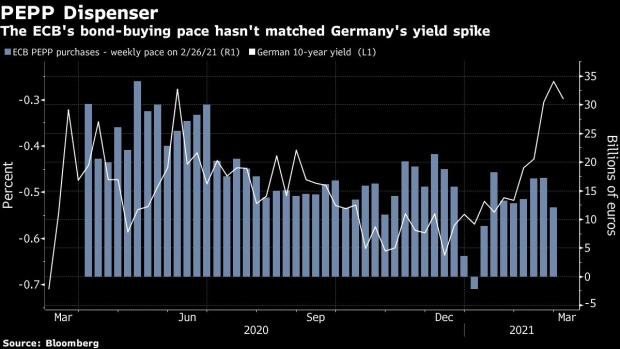Mar 7, 2021
Traders Seek ECB’s Verdict on Bond Selloff in Stepped-Up Buying
, Bloomberg News

(Bloomberg) -- Investors looking for a more definitive signal of what the European Central Bank really thinks about the latest bond selloff are likely to get one in the coming week.
Data on the central bank’s debt purchases are due on Monday and will cover the week through March 5, when a global rout in bonds hit fever pitch. While several ECB Governing Council members have attempted to soothe nerves over the recent rise in yields, the institution’s bond-buying program hasn’t shown an acceleration to match.
Adding to the unease among investors is the near-silence on the topic from President Christine Lagarde. While ECB Executive Board member Fabio Panetta showed that there is some concern when he said the current rise in yields is “undesirable” and “must be resisted,” some of his colleagues have been notably more sanguine. Markets probably won’t get another vocal steer until after Thursday’s rate decision, as policy makers have now entered a quiet period.
“It’s all very well, voicing dissatisfaction,” Richard McGuire, head of rates strategy at Rabobank, said of ECB officials’ comments. “But the markets appear to be, given the limited response to this concerted rhetorical campaign, looking for the ECB to put its money where its mouth is.”
No Match
The most recent data on the ECB’s pandemic bond-buying program showed it settled 16.9 billion euros ($20.1 billion) of purchases in the week through Feb. 26, the least in four weeks. The net amount was even lower at 12 billion euros because of large redemptions, despite the fact that the ECB would have known those redemptions were coming.
The peak of the selloff arrived two days later, with yields on Treasuries and European debt hitting levels last seen during the March 2020 turmoil.
Louis Harreau, a strategist at Credit Agricole, called the PEPP purchase amount “ridiculous.”
“I grew up with the motto ‘don’t fight the ECB’ and it is like today, the market is fighting the ECB,” Harreau added.
German yields have been pulled higher by their U.S. and U.K. counterparts which are far ahead in the vaccine race, suggesting investors might be getting ahead of the continent’s lagging recovery.
Italian 10-year bond yields doubled off a record low to 0.84% in the second half of February. Their premium over German peers, a key gauge of risk in the region, is 17 basis points above a six-year low set on Feb. 12.
Bond Talk
While investors have heard a lot from ECB officials in the past week, they’ve been pulled in varying directions.
A day after Panetta’s remarks, Vice President Luis de Guindos said bond spreads are “very calm,” and Bundesbank President Jens Weidmann said the rise in yields is “not such that this is a particularly worrisome development.”
Those remarks are in line with the broad view of Governing Council members, according to officials familiar with internal discussions, who say policy makers believe they can manage the risk from rising yields with verbal interventions -- including a pledge to act if needed.
Closely Monitoring
Lagarde last commented directly on bond markets on Feb. 22, saying the central bank is “closely monitoring” nominal bond yields. In a pre-recorded speech to German business last week, she simply reiterated the ECB’s standard line that it won’t let financing conditions tighten prematurely.
That stance is arguably reminiscent of a year ago, when the president sent Italian bonds into a tailspin by saying the ECB’s job isn’t to rein in yield spreads.
Now, bond investors are waiting for bond-buying to match the Governing Council’s rhetoric. Frederik Ducrozet, global strategist at Banque Pictet & Cie, expects Monday’s data to show that the pace of weekly net purchases rose above 20 billion euros.
“It is only fair to expect the Executive Board to walk the talk by temporarily increasing the pace of PEPP purchases,” Ducrozet said.
This Week
- Bond sales from Germany, Italy, Netherlands and Portugal are expected to halve next week to 15.5 billion euros, according to Commerzbank AG.
- Germany pays 13 billion euros of redemptions and Ireland pays small coupons next week
- The U.K. will offer just over 2 billion pounds of 10-year gilts and 20-year inflation-linked debt next week; the BOE will buy back 4.4 billion pounds of debt across three operations
- Data for the coming week are mostly relegated to second-tier, backward-looking figures; January industrial production numbers are due from Germany on Monday and the euro-area on Friday
- Lagarde speaks at the press conference following the monetary decision on Thursday
- Investors will be looking for BOE Governor Andrew Bailey’s views on the budget when he gives a speech on the economic outlook on Monday
- DBRS Ltd. reviews Belgium and Moody’s Investors Service reviews Ireland on Friday
©2021 Bloomberg L.P.